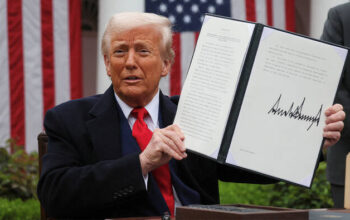By Staff Reporter
ISLAMABAD: Pakistan has formally begun negotiations with the United States to tackle newly imposed reciprocal tariffs, with Finance Minister Muhammad Aurangzeb and US Trade Representative Ambassador Jamieson Greer launching the process via a conference call on Friday, a senior official said.
The talks follow US President Donald Trump’s decision earlier this year to slap steep tariffs on a slew of countries, including a 29% duty on Pakistani goods. Trump defended the move as essential to correct trade imbalances and address what he called unfair treatment of American goods abroad, a step that’s sparked concerns about setbacks to the global economy.
The retaliatory tariffs, which threaten to disrupt Pakistan’s export market in the US, have been temporarily postponed but still loom large over the South Asian nation’s economy.
For Pakistan, the tariffs hit at a critical juncture as Islamabad leans on export-driven growth to bolster its fragile recovery.
Aurangzeb, back in April, called the development as “both a challenge and an opportunity to reset trade ties,” signaling plans for a high-level delegation to head to Washington soon to push the discussions forward.
“Pakistan’s formal negotiations on US reciprocal tariffs kick-started between Mr. Muhammad Aurangzeb, Pakistan’s Finance Minister and Ambassador Jamieson Greer, United States Trade Representative through a telephonic/conference call on 30th May, 2025,” Khurram Schehzad, advisor to the finance minister said in a X post. “The two sides exchanged their viewpoint through a constructive engagement with the understanding that technical level detailed discussions would follow in the coming few weeks.”
Schehzad said both sides expressed confidence in advancing the negotiations toward a successful conclusion at the earliest.
The US stands as Pakistan’s largest export market, a lifeline now under pressure from the fresh duties. Pakistan shipped $5.44 billion in goods to the US in 2024, per central bank data, with exports climbing 10% to $4 billion from July to February of the current fiscal year compared to the prior period. That’s left Islamabad with a $3 billion trade surplus with the US. Textiles dominate the mix, making up nearly 90% of those exports, and analysts warn they’ll bear the brunt of the tariff hit.
Experts have cautioned that Pakistan’s edge could erode further if rivals like China, Bangladesh, and Vietnam pivot more aggressively to Europe, tightening competition in alternative markets.
A high-level Pakistani delegation is slated to visit Washington in the coming weeks to keep the talks moving. As a bargaining chip, Pakistan is dangling concessions for US companies to invest in its mining sector, zeroing in on Balochistan province.
Commerce Minister Jam Kamal, in a May 23 interview with Reuters, said Islamabad will pitch joint ventures with local firms and lease grants to US businesses. “There is untapped potential for US companies in Pakistan, from mining machinery to hydrocarbon ventures,” he said.
Kamal also said the government plans to ramp up imports of US cotton and edible oils—goods in short supply locally, to sweeten the deal. Pakistan intends to roll out these mining offers during the tariff talks, while gradually trimming its own tariffs in the upcoming federal budget. Still, Kamal noted the US hasn’t yet pinpointed specific trade barriers or priority sectors.
President Trump, earlier this month, hinted at broader engagement, saying he’s working on “big deals” with both Pakistan and India. That nod comes fresh off Washington’s role in brokering a ceasefire on May 10 between the nuclear-armed neighbors after their worst clashes in decades.
Copyright © 2021 Independent Pakistan | All rights reserved



